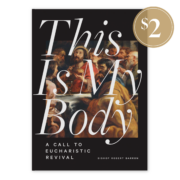Roland Orzabal and Curt Smith wrote and produced a number of popular and critically-acclaimed albums in the 1980s and early 1990s as the backbone of the British New Wave group Tears for Fears. Deriving their name from the “primal therapy” of Arthur Janov, the band’s lyrics were always filled with psychological and spiritual explorations. In a similar style to contemporary acts like Crowded House, The Style Council, and Prefab Sprout, Tears for Fears blended synthesizers and keyboards with conventional rock guitars, bass, drums, and crystal-clear vocals. It all came together in radio-friendly but surprisingly sophisticated tracks like “Mad World,” “Shout,” and “Head Over Heels.”
But the band’s most famous song remains the 1985 hit “Everybody Wants to Rule the World,” from the nearly flawless album Songs from the Big Chair. The song remains in heavy rotation on classic rock radio stations to this day, hearkening back to Cold War politics while proposing the need for a metaphysics to govern all secular power. The band offers us a soulful ethical challenge, perhaps channeling Aleksandr Solzhenitsyn’s famous 1978 speech at Harvard. Smith sings, “Help me make the most of freedom and of pleasure. Nothing ever lasts forever.” Appropriately, the band recently played their signature song on the Late Show with Stephen Colbert on the night Russia invaded Ukraine.
When Orzabal and Smith parted ways in 1991, Orzabal continued to make music on his own as Tears for Fears; but at long last, the pair have reunited, producing The Tipping Point, a welcome collection of new songs that are just as rich and timely as the best stuff from their prime.

Kicking off with “No Small Thing,” the music builds from a simple acoustic anthem reminiscent of Billy Bragg into a lush, melodic exploration of interior freedom in the age of competing sources of information. “You’re my way out of hell,” Orzabal sings. The title track, “Tipping Point,” comes next, welcoming us with a delicate electronic intro before giving way to a layering of harmonies and production elements that would fit nicely on Big Chair. As usual, the lyrics go much deeper than a typical pop song, exploring Orzabal’s grief over the death of his wife in 2017 (the first of several songs dealing with her demise as a result of alcoholism, depression, and dementia). Orzbal sings, “Who’s that ghost knocking at my door? You know that I can’t love you more.” In the glory days of MTV, the music video might have made an artistic statement in the vein of Peter Gabriel.
The band has said that “Break the Man” is about “toxic patriarchy,” and it features the platitude “this is not who we are.” But the song is no moralistic tirade, and it quickly develops into a catchy, conventional appreciation of the fairer sex. Men should simply be grateful for the women who humble them and are superior to them in so many ways. “This is love,” Orzabal and Smith proclaim. Hear, hear. “My Demons” is the least interesting track musically, but the lyrics are provocative. Amid the dehumanizing influences of the materialistic, high-tech First World, we remember, “These human hands need a human touch.”
“Rivers of Mercy” is the centerpiece of the record, weaving lyrically from a bleak picture of our world to a more hopeful vision of the victory of divine love. Orzabal sings, “I too often see the world through a veil of tears,” naturally evoking in Catholics the homophone “vale of tears” from the Salve Regina. Theological richness proceeds from there, as the singer longs for healing from “manna from heaven” and immersion in “the infinite sea.” Orzabal asks, “Dare I imagine some faith and understanding?” as the track builds from a piano ballad to a throw-back ’80s groove with haunting backing vocals before finishing in a soaring, multi-instrumental prayer. Press the back button and play this one a few extra times.

“Please Be Happy” follows next, taking us from an ethereal high back down into Orzabal’s expression of loss. This beautiful song features the devastating reassurance, “the world won’t break apart as easy as the glass you dropped and smashed when you tried to climb the stairs.” The next track, “Master Plan,” would also fit well on an earlier Tears for Fears album, with an incredibly catchy chorus that evokes the Beatles “I am the Walrus.” And here again, the lyrics are far more interesting—especially to religious people—than a typical pop song: “Hear me now ’cause things ain’t working out. If my soul be damned, it’s all part of the masterplan.”
“End of Night” has a bigger and better electronic intro than the one on “My Demons,” and it leads into the very best chorus on the album. The classic pop harmonies will make you want to put on your vintage ’80s gear and bop around. Moreover, the lyrics are a timely encouragement to let the power of love help us detach from the darkness of current events. We hear, “She showed me the world within and told me no need to worry about the world.”
The album ends with Smith’s gentle falsetto on “Stay,” which expresses the sober wisdom of a man beyond middle age. There is no need for anyone to pretend that Tears for Fears rule the world as the fresh faces of British pop music anymore; but more than forty years after they started as a band, they still have much to offer us, and their return is most welcome. Check out The Tipping Point for refreshing throwback music with timeless lyrical quality.
